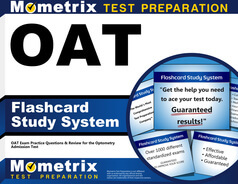If you are considering a future in the optometry field, then the Optometry Admission Test is a must when applying to optometry school. This test is used along with other admission tools to help schools assess your eligibility for courses and programs.
Click “Start Test” above to take a free OAT practice test, and check out our premium-quality OAT test prep resources by clicking the links below!
OAT Practice Tests by Subject
If you need some extra practice in a specific subject, click one of the subjects below to get started on a subject-specific OAT practice test.
Exam Eligibility
There are no struct eligibility requirements for this exam. However, it is strongly suggested that you finish at least one year of college, and most OAT test-takers have completed at least two years. Your college courses should include chemistry, organic chemistry, and biology.
OAT Test Outline
The OAT contains 230 multiple-choice questions and has a time limit of 4 hours and 5 minutes.
The test is split into four sections.
1. Survey of the Natural Sciences (100 questions)
The questions in this section are split into three main topics:
Biology (40 questions)
- Cell and molecular biology
- Diversity of life
- Function and structure of systems
- Evolution and ecology
General Chemistry (30 questions)
- Stoichiometry and general concepts
- Gases
- Liquids and solids
- Acids and bases
- Chemical equilibria
- Solutions
- Thermodynamics and thermochemistry
- Chemical kinetics
- Oxidation-reduction reactions
- Atomic and molecular structure
- Periodic properties
- Nuclear reactions
- Laboratory
Organic Chemistry (30 questions)
- Mechanisms
- Chemical and physical properties of molecules
- Stereochemistry
- Nomenclature
- Individual reactions of the major functional groups and combinations of reactions to synthesize compounds
- Acid base chemistry
- Aromatics and bonding
2. Reading Comprehension (50 questions)
The questions in this section are centered around three reading passages that cover various scientific topics. You will not be expected to know or understand the topics before taking the test.
3. Physics (40 questions)
The questions in this section cover the following topics:
- Units and vectors
- Linear kinematics
- Statics
- Dynamics
- Rotational motion
- Energy and momentum
- Simple harmonic motion
- Waves
- Fluid statics
- Thermal energy and thermodynamics
- Electrostatics
- DC circuits
- Optics
4. Quantitative Reasoning (40 questions)
The questions in this section cover the following topics:
- Equations and expressions
- Inequalities
- Exponential notation
- Absolute value
- Ratio and proportions
- Graphical analysis
- Data analysis, interpretation, and sufficiency
- Quantitative comparison
- Probability and statistics
- Applied mathematics
Check out Mometrix's OAT Study Guide
Get practice questions, video tutorials, and detailed study lessons
Get Your Study Guide
Registration
To register for the OAT exam, you must first obtain an ADA PIN, which will allow you to submit an application on their website. Your application must include the $520 testing fee, which is non-refundable.
Once your application has been approved, you will be sent further information on scheduling an examination appointment with Prometric.
How to Study for the OAT Exam
Think you aren’t a good test-taker? Maybe on a study-time crunch? Or just don’t know how to begin studying? Mometrix has designed a new Study Secrets course to help every student, no matter what study scenario you are in. Here’s what you’ll find in the Study Secrets Course:
- Techniques to Conquer Procrastination
- Steps to building a Study Plan custom to your learning style
- 7 Effective Note-Taking Methods
- Test-Taking Tips
- Memory Techniques and Mnemonics
- And much more!
Everyone learns differently, so we’ve tailored our Study Secrets Course to ensure every learner has what they need to prepare for their upcoming exam or semester. Click below to check it out!
Test Day
You should arrive about 30 minutes early to the testing center on exam day, which will leave time for the check-in process to take place. This process involves checking your ID and signing a confidentiality form.
Once you are checked in, you will be asked to place all personal or prohibited items in a secure locker outside the testing area, and you will be given a piece of scratch paper and two pencils to take notes with during the exam.
Once you are ready, the proctor will lead you to the testing station and provide a brief introduction to the testing system before the exam begins.
How the Test is Scored
Your OAT score is established using a scaled scoring system, which takes the number of questions you answered correctly (your raw score) and converts it to a numerical score from 200 to 400. You will receive an unofficial score report before you leave the testing center, and an official score report will be sent to the school of your choice.
The score you need in order to pass is determined by the school you are applying to.
Retaking the Test
If you wish to retake the test, you must wait until 60 days have passed since your original test date. After 60 days, you may submit a new application and pay the full examination fee.
You are not able to retake specific portions of the test—you must retake the entire test.
Check out Mometrix's OAT Flashcards
Get complex subjects broken down into easily understandable concepts
Get Your Flashcards
FAQs
Q
How many questions are on the OAT test?
A
There are 230 multiple-choice questions on the test.
Q
How long is the OAT test?
A
The time limit for the test is 4 hours and 5 minutes.
Q
What is the passing score for the OAT test?
A
There is no set passing score for this test. Schools individually choose their own passing score requirements.
Q
How much does the OAT test cost?
A
As of July 1, 2024, the examination fee is $520.
